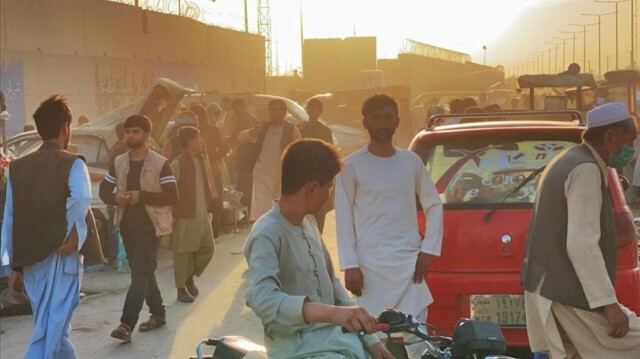
China-led Shanghai Cooperation Organization and Russia-led Collective Security Treaty Organization are meeting in Dushanbe in middle of September to discuss Afghanistan
At a time when the eight-member Shanghai Cooperation Organization (SCO) is commemorating 20 years of its existence, the situation in Afghanistan is posing a challenge to its three overarching goals, i.e., to ensure safer borders, secure societies, and stable economic progress.
Recent weeks have shown a flurry of activities in the Eurasian region. The China-led SCO summit is scheduled in Dushanbe, the capital of Tajikistan, on Sept. 17. Just a day ahead, leaders of the Russia-led Collective Security Treaty Organization (CSTO) will also meet in Dushanbe. These two significant alliances will discuss and formulate measures to stabilize the situation in and around Afghanistan.
During his meeting with Quraishi in Dushanbe, Tajikistan's President Imomali Rahmon stressed the need to ensure that the rights of Afghanistan's minority ethnic groups such as the Tajiks are not compromised and that they are fully represented at all levels of the society. Secondly, a desire was expressed to guarantee that no elements, either refugees or extremists, will be illegally crossing the Tajik-Afghan border. Thirdly, Rahmon acted to be seen as a champion of not only Tajikistan but also of the larger ethnic Tajik groups living across borders. The ethnic Tajiks account for 27 million population in the world.
- G20 to discuss Afghanistan in October
Over the past few weeks, Russia is also engaged in consultations to coordinate peacebuilding in the region. On Aug. 27, Russian Foreign Minister Sergey Lavrov visited Italy, the current president of G20, to coordinate efforts on Afghanistan. The G20 summit is expected to take place in Rome from Oct. 30-31.
Referring to Italian Foreign Minister Luigi Di Maio's suggestion for an inclusive format on Afghanistan, Lavrov pointed out that five key neighboring states, i.e., the three Central Asian states plus Pakistan and Iran, have not been invited to the G20 consultations so far.
"Without them, this discussion will not be complete," said Lavrov. He said the Italian hosts have promised to come out with a useful format to address the situation.
According to Yulia Kudryashova, an expert at Moscow's International Relations Institute, Central Asia, owing to its strategic geographical location, is situated at the core of the SCO landmass. He said challenges such as an unstable situation in Afghanistan, drug trafficking, and the flow of illegal arms poses a risk to the stability of the entire region.
Russia's Defence Minister, Sergey Shoigu, has reminded that the situation in Afghanistan was fraught with the risk of militants infiltrating into the CSTO countries, while drug trafficking also remained a threat.
"We would not want all this to cross over and creep into our territories, the territories of the CSTO countries," Shoigu said.
"We would like stability established, for a coalition government to be formed so that all the peoples who inhabit Afghanistan are represented, and stability eventually prevails," he added.
- Summits to discuss risks and opportunities
The two summits that will take place in mid-September will take note of risks emanating from Afghanistan and will focus on issues to help Afghans to ensure stability and the normal functioning of civil institutions in their country.
Highlighting the significance of the SCO in the current context, Secretary-General Vladimir Norov said its role had increased immensely to normalize the situation in Afghanistan.
He recalled that the July 2021 meeting of the SCO foreign ministers in Dushanbe held within the framework of the SCO-Afghanistan Contact Group stated that they would support the grouping in fulfilling its important role in achieving peace and reconciliation in Afghanistan. The member countries reaffirmed their commitment to strengthening coordination and cooperation at the regional and international levels to promote lasting peace and sustainable development in Afghanistan.
Norov said the SCO is considering a plan to take practical measures to promote the social and economic reconstruction of Afghanistan. He expected that appropriate preconditions would be created to allow economic cooperation. There are reasons to expect a qualitative breakthrough also in innovative areas, such as green energy, digital economy, etc.
- Afghanistan is test case for SCO
In general, a continuation of violence in Afghanistan and the threats emanating from there have compelled the states of the region to take additional measures to strengthen security, which diverts the resources necessary to solve socio-economic problems and implement plans for the development and modernization of the states of the region.
Determining the possible directions of combating the listed threats, it seems important to advance active interaction within the SCO-Afghanistan Contact Group (CG). The situation requires joint monitoring of the SCO member states with the participation of Afghan representatives, observers, and partners.
In the coming months, Afghanistan will serve as a test case to demonstrate how efficient and effective platform SCO could prove for the implementation of transcontinental and regional initiatives such as the Belt and Road, North-South transport corridor, Great Eurasian Partnership, SCO Green Belt, and others. Strategic analysts will be keenly observing the capacity of the SCO to solve complex tasks and create a solid legal base and effective mechanisms of interaction.
*Opinions expressed in this article are the author's own and do not necessarily reflect the editorial policy of the Anadolu Agency

